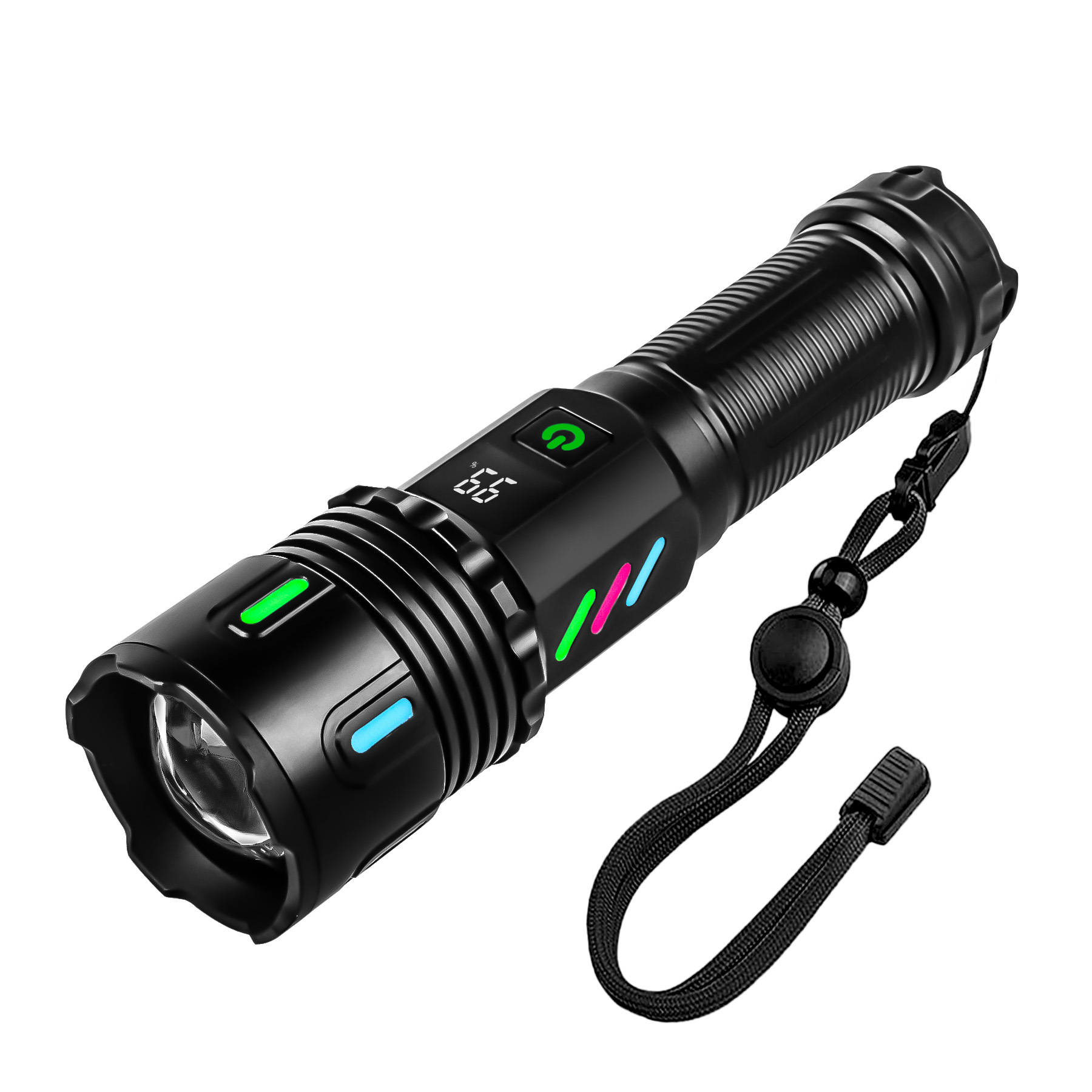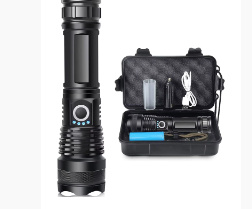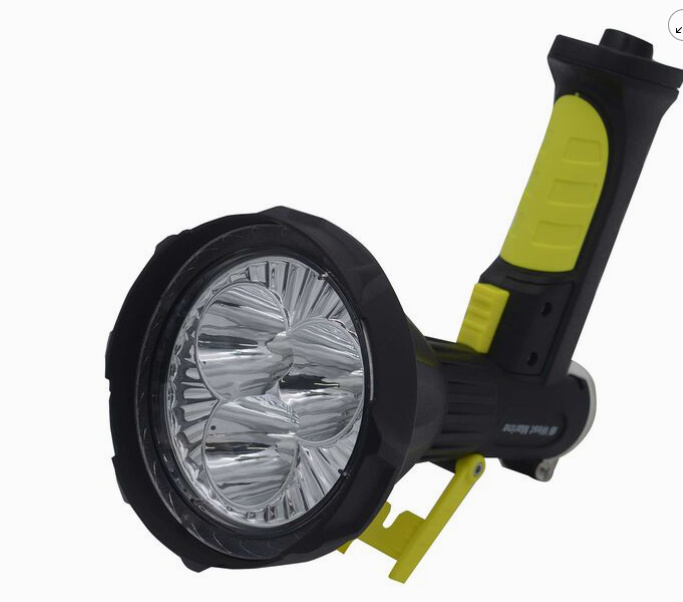Why Flashlights are Essential for Business Emergency Kits

Imagine a sudden power outage during a busy workday. Without a reliable light source, navigating dark hallways or locating essential items becomes a challenge. This is exactly why flashlights are essential for business emergency kits. A flashlight in your emergency kit can make all the difference. It ensures safety, helps you avoid accidents, and even allows you to signal for help when needed. Flashlights are essential for preparedness because they provide visibility in unlit environments, aid in disaster response, and support first aid efforts. Whether you're dealing with a disaster or a routine emergency, having a flashlight on hand is critical for your business's preparedness and response.
Key Takeaways
Flashlights help you see in the dark during emergencies. They keep you safe and stop accidents.
Pick strong and waterproof flashlights. They work well in tough places.
Check your flashlights often to make sure they work. Keep them ready for emergencies.
Teach workers how to use flashlights the right way. Practice using them in emergency drills.
Put flashlights where people can find them quickly. This helps during blackouts or when leaving a building fast.
Immediate Benefits of a Flashlight in an Emergency Kit

Providing Essential Illumination
Navigating power outages and dark spaces
When a power outage strikes, everything can come to a standstill. Without light, even simple tasks like finding your way to the exit or locating important items become difficult. A flashlight in an emergency kit ensures immediate access to light, helping you navigate dark spaces safely. Whether it’s a sudden blackout or a disaster that cuts off electricity, having a reliable source of light can make all the difference. You’ll be able to move around confidently without stumbling or risking injury.
Ensuring visibility in hazardous conditions
Emergencies often create hazardous environments. Broken glass, debris, or slippery floors can turn any space into a danger zone. A flashlight provides immediate illumination, allowing you to spot these hazards before they cause harm. It’s not just about seeing—it’s about staying safe. With a flashlight in hand, you can assess your surroundings and make informed decisions to avoid accidents.
Enhancing Safety and Security
Preventing accidents in low-light environments
Darkness increases the risk of accidents. Imagine trying to evacuate a building without proper lighting. A flashlight ensures enhanced safety by illuminating your path and reducing the chances of trips or falls. It’s a simple tool, but it plays a huge role in keeping you and your team secure during emergencies.
Identifying potential threats or hazards
A flashlight isn’t just for lighting up the dark—it’s also a tool for security. In low-light situations, it helps you identify potential threats or hazards. Whether it’s spotting a structural issue after a disaster or ensuring no one is left behind during an evacuation, a flashlight gives you the visibility you need to act quickly and effectively.
Emergency Signaling and Communication
Attracting attention during rescue efforts
In emergencies, getting noticed can save lives. A flashlight can act as a beacon, signaling for help when you need it most. Many modern flashlights come with strobe or SOS functions, making them visible from a distance. This feature is especially useful during rescue efforts, ensuring you’re not overlooked.
Communicating in low-visibility situations
When visibility is poor, communication becomes a challenge. A flashlight bridges that gap. You can use it to signal others, guide them to safety, or even send simple messages through light patterns. It’s a versatile tool that goes beyond just providing light—it helps you stay connected when it matters most.
A flashlight is more than just a source of illumination. It’s a lifeline in emergencies, offering safety, security, and a way to communicate when other methods fail.
Key Features of an Emergency Flashlight
Durability and Build Quality
Impact resistance for tough conditions
Emergencies can be unpredictable, and your flashlight needs to handle whatever comes its way. Look for models made from sturdy materials like aluminum or titanium. These materials ensure your flashlight can survive accidental drops or rough handling without breaking. Avoid flashlights with polymer bodies, as they may not offer the same level of reliability. A durable flashlight is your best bet for staying prepared in tough situations.
Water resistance for various environments
Emergencies don’t always happen indoors. Whether it’s a flood or heavy rain, a water-resistant flashlight is essential. Check for an IP rating, which tells you how well the flashlight can handle water and dust. An IP68-rated flashlight, for example, works well in outdoor emergencies or harsh weather. This feature ensures your flashlight stays reliable, no matter the environment.
Battery Life and Power Options
Long-lasting batteries for extended use
In emergencies, you can’t afford to run out of light. A flashlight with long-lasting batteries ensures you have illumination during prolonged outages. Models with extended battery life are critical when access to power sources is limited. Choose a flashlight that uses commonly available batteries for added convenience.
Rechargeable vs. disposable battery options
Rechargeable batteries offer long-term cost savings and are more eco-friendly. They last longer than disposable ones and reduce waste. However, disposable batteries are easier to replace in a pinch. Consider your needs and decide which option works best for your emergency flashlight.
Feature | Rechargeable Batteries | Disposable Batteries |
|---|---|---|
Power Capacity | Higher | Lower |
Cost Over Time | Lower | Higher |
Environmental Impact | Lower | Higher |
Brightness and Beam Distance
Lumens for adequate brightness levels
Brightness matters when you’re navigating dark spaces or signaling for help. For general emergencies, a flashlight with 100 to 500 lumens works well. Indoor use typically requires 200-300 lumens, while outdoor conditions may need higher levels. A reliable flashlight with the right brightness ensures you’re ready for any situation.
Adjustable beam settings for versatility
Emergencies often demand flexibility. A flashlight with adjustable beam settings lets you switch between wide and focused beams. This feature is especially useful for search and rescue operations, where you need both precision and coverage. A flashlight with a longer beam distance enhances visibility, making it easier to locate distant objects or navigate large areas.
Tip: Choose a flashlight with multiple light modes for added versatility.
Portability and Ease of Use
Compact designs for easy storage
When it comes to emergency kits, space is always at a premium. You don’t want bulky items taking up valuable room. That’s why compact flashlights are a game-changer. Their small size makes them easy to store in tight spaces like drawers, cabinets, or even glove compartments. You can tuck them into your emergency kit without worrying about them crowding out other essentials.
Some models are so lightweight and slim that you can carry them in your pocket or clip them onto a belt. This portability ensures you always have a flashlight within reach when you need it most. Whether you’re evacuating a building or inspecting a dark corner, a compact flashlight won’t weigh you down.
Tip: Look for flashlights with foldable or collapsible designs. These save even more space while still delivering powerful performance.
User-friendly controls for quick operation
In an emergency, every second counts. You don’t want to fumble with complicated buttons or settings. A flashlight with simple, user-friendly controls ensures you can turn it on instantly. Many models feature a single-button operation, so you can switch between modes—like high beam, low beam, or strobe—with just one press.
Flashlights with textured grips or anti-slip designs are even better. They stay secure in your hand, even if you’re wearing gloves or dealing with wet conditions. Some models also include glow-in-the-dark buttons, making them easy to locate in pitch-black environments.
Note: Test your flashlight’s controls before adding it to your kit. Familiarity with its operation can save precious time during a crisis.
A portable, easy-to-use flashlight isn’t just convenient—it’s essential. It ensures you’re ready to act quickly and effectively, no matter the situation.
Practical Applications of a Flashlight in an Emergency Kit

Navigating Dark or Hazardous Areas
Guiding employees to safety during evacuations
Emergencies often lead to power outages, leaving your workplace in complete darkness. A flashlight in an emergency kit becomes your go-to tool for guiding employees to safety. Imagine trying to evacuate a building without any light—it’s not just inconvenient, it’s dangerous. A flashlight provides immediate illumination, helping you lead others through dark hallways or stairwells. It ensures everyone can see obstacles and avoid accidents.
Real-world examples highlight how flashlights save lives. A group of hikers in the Appalachian Mountains used their flashlight to find their way back after getting lost at night. Similarly, a motorist stranded on a deserted road used a flashlight to signal for help, catching the attention of a passing driver. These scenarios show how a reliable source of light can make all the difference in critical moments.
Inspecting equipment or facilities in low-light conditions
Emergencies don’t just disrupt daily operations—they can also damage equipment or facilities. A flashlight helps you inspect these areas when visibility is poor. Whether you’re checking for structural damage after a disaster or ensuring machinery is safe to use, a flashlight provides the light you need to assess the situation.
Flashlights are especially useful during power outages. They illuminate dangerous areas, allowing you to avoid hazards like broken glass or slippery floors. They also help you locate essential items in your emergency survival kit, ensuring you’re prepared for the next steps.
Supporting Rescue and Recovery Efforts
Locating missing individuals or items
In chaotic situations, people or important items can go missing. A flashlight helps you search efficiently, even in the darkest conditions. Its beam can cut through the gloom, making it easier to spot what you’re looking for. For example, hikers have used flashlights to locate lost trail markers and even signal rescue helicopters.
Assisting first responders during emergencies
First responders rely on flashlights to navigate dangerous areas and perform their duties effectively. These tools provide immediate illumination, helping them inspect wounds, locate supplies, and guide others to safety. Flashlights with strobe or SOS functions are particularly helpful, as they can signal for help from a distance.
Modern flashlights also offer multipurpose functionality, making them indispensable in rescue efforts. Whether it’s lighting up a collapsed building or assisting with first aid, these tools ensure safety and efficiency during emergencies.
Providing Comfort and Reassurance
Reducing panic among employees
Darkness can create fear and confusion, especially during emergencies. A flashlight provides a sense of security by lighting up the surroundings. When employees see a clear path or know someone is guiding them, they’re less likely to panic. This calmness can make evacuations or rescue efforts much smoother.
Creating a sense of control in chaotic situations
In any emergency, feeling in control can make a huge difference. A flashlight gives you that control. It helps you assess your environment, make informed decisions, and take action. Whether you’re leading an evacuation or inspecting damage, having a flashlight in your emergency survival kit ensures you’re prepared to handle the situation confidently.
A flashlight isn’t just a tool—it’s a lifeline. It provides light, safety, and reassurance when you need it most.
Tips for Including Flashlights in Emergency Kits
Strategic Placement and Accessibility
Storing flashlights in easily accessible locations
When an emergency strikes, you don’t want to waste time searching for a flashlight. Store flashlights in places where they’re easy to grab. Think about areas like desks, cabinets, or wall-mounted holders. These spots ensure quick access when you need light the most. A flashlight in an emergency kit should always be within reach, especially during power outages or evacuations.
Ensuring availability in key areas like exits and meeting points
Place flashlights near exits, stairwells, and designated meeting points. These are the areas people naturally head to during emergencies. Having a flashlight ready in these locations boosts safety and security. It ensures everyone can navigate dark spaces and gather safely. A well-equipped emergency kit with strategically placed flashlights can make all the difference in a crisis.
Regular Maintenance and Testing
Checking batteries and functionality periodically
A flashlight is only helpful if it works. Make it a habit to check the batteries and test the flashlight regularly. Dead batteries or faulty lights can leave you in the dark when you need them most. Set a schedule to inspect your emergency kit every few months. Replace batteries and test the flashlight’s brightness to ensure it’s ready for action.
Replacing damaged or outdated flashlights
Flashlights don’t last forever. Over time, wear and tear can affect their performance. If your flashlight shows signs of damage or isn’t as bright as it used to be, replace it. Modern flashlights often have better durability, longer battery life, and improved features. Keeping your emergency kit updated ensures you’re prepared for any situation.
Training Employees on Proper Use
Educating staff on flashlight operation
A flashlight is a simple tool, but not everyone knows how to use it effectively. Train your employees on the proper use of a flashlight. Show them how to switch between modes, adjust the beam, and check the battery. Familiarity with these basics can save precious time during an emergency.
Incorporating flashlight use into emergency drills
Practice makes perfect. Include the use of a flashlight in your emergency drills to prepare your team for real-life scenarios. Use compact, durable flashlights with intuitive controls. Choose models with higher lumens (100 to 500) for better visibility during drills. Ensure everyone knows how to operate the flashlight and understands its role in emergency response. These drills help employees feel confident and ready to act when it matters most.
Tip: Keep spare batteries or rechargeable options handy to ensure your flashlights stay powered during extended emergencies.
Flashlights are an indispensable component of any business emergency kit. They provide essential light during power outages, ensuring safety and mobility in dark or hazardous conditions. Their versatility makes them invaluable for navigating through dangerous areas, signaling for help, and aiding in first aid or rescue efforts. By choosing durable, portable models with long battery life, you can enhance your preparedness for any disaster. Prioritizing flashlights in your emergency planning ensures your team stays safe and ready to respond effectively when emergencies strike.
Remember, a well-equipped emergency kit with the right flashlight can make all the difference in protecting your employees and maintaining control during a crisis.
FAQ
What type of flashlight is best for an emergency kit?
Choose a durable, compact flashlight with long battery life. Look for water resistance and adjustable brightness settings. A flashlight with rechargeable batteries or a hybrid power option works well for emergencies. It ensures reliability when you need it most.
How many flashlights should I include in my emergency kit?
Include at least one flashlight per person in your emergency kit. This ensures everyone has access to light during emergencies. Place additional flashlights in key areas like exits or meeting points for added safety.
How often should I check the flashlights in my emergency kit?
Test your flashlights every three to six months. Check the batteries and ensure the flashlight works properly. Replace damaged or outdated flashlights to keep your kit ready for emergencies.
Can I use my phone’s flashlight instead of a dedicated one?
A phone flashlight can help in minor situations, but it’s not reliable for emergencies. Phones have limited battery life and may fail during extended outages. A dedicated flashlight in your emergency kit is more dependable.
What other items should I pair with a flashlight in my emergency kit?
Pair your flashlight with spare batteries, a first aid kit, and a whistle. These items enhance your preparedness and safety during emergencies. A well-stocked kit ensures you’re ready for any situation.
See Also
Essential Advice for Finding Wholesale Flashlights Effectively
A Complete Guide to Selecting Your Ideal Flashlight Supplier
Boosting Your Brand with Customized Flashlights for Promotions
Successful Marketing Approaches for Your Flashlight Wholesale Venture
